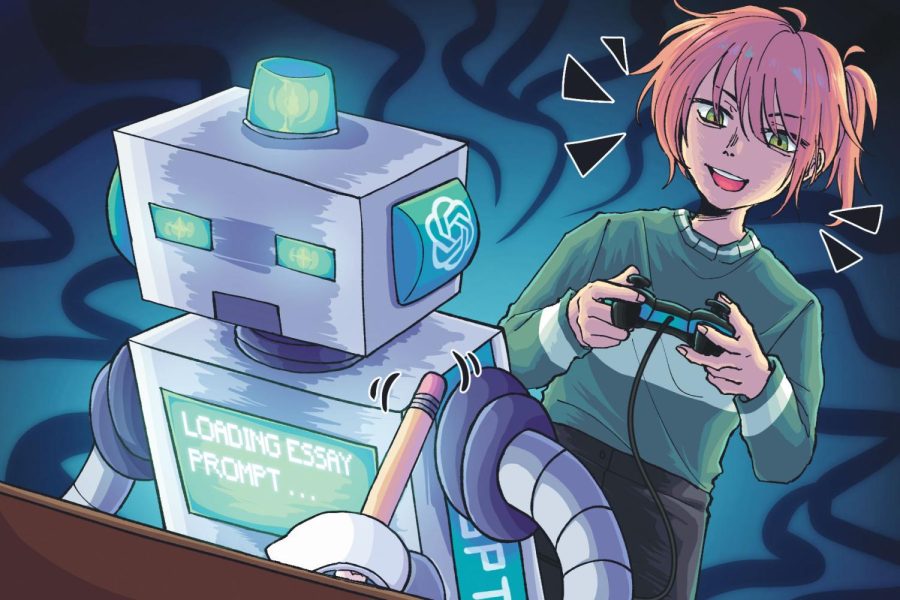AI technology infiltrates GBN
Students use new programs to cheat
ChatGPT, a newly developed artificial intelligence chatbot, has become increasingly popular among students, who are using it to help review for exams and explore different uses of the technology.
A Glenbrook North student, who wishes to remain anonymous to avoid potential disciplinary action, claims to have used an AI site to write a response to a final exam.
“I asked the paragraph generator different questions so that I could get certain responses out of the AI that could help me put the paper together,” said the student. “It’s like building a puzzle.”
“I didn’t want to do my work, and I wanted to find some easy alternative to do my work,” said the student. “I feel like that’s the answer for why most people want to use ChatGPT or a different kind of AI.”
ChatGPT is a free AI site available to the public, which was released by OpenAI in November. Users can instruct the chatbot to complete many different tasks, like writing an essay of a specified length, crafting a poem about a certain topic, answering questions, creating a script in the style of a favorite TV show or writing a response to almost anything requested.
Some students have used ChatGPT to study, like junior Logan Dane. He entered his U.S. history key terms into ChatGPT and asked it to use characters and scenes from “Family Guy” to illustrate the meaning of the terms.
“I really just started playing around with it at the beginning, and I realized pretty quickly on that it was really accurate … to almost being like a teacher and that it is able to summarize concepts using the same methods that a teacher would teach it in class,” Dane said.
According to Scott Williams, instructional supervisor for social studies, teachers in the Social Studies Department are never going to assume students are being anything other than honest, but there are things teachers want to be more careful about with ChatGPT.
“We may need to have students do more writing in person, so we may see an alteration or a diminishing of, ‘Here’s an essay question, do it at home and bring it in,’” said Williams. “We may start to interview students more … ‘Here’s your essay. I love here in paragraph two where you talked about imperialism this way. Can you rephrase that for me?’ A student who really wrote their own paper should be able to rephrase and go into greater depth about how they reached the conclusion that they’re presenting me.”
According to Ed Solis, associate principal for curriculum and instruction, teachers need to have professional development time to research how other schools and universities have approached their stance and communication about AI.
“When the teachers here learn more about it [and] understand the dos and don’ts that they see fit, and so that students aren’t losing the ability to compose and to think while they’re writing, then we can develop ways that we could use it to enhance our thinking and our writing in the classroom,” Solis said.
Columnist Stephen Marche said in a phone interview that essays were a way to test students’ ability to read and interpret things, look for sources to construct meaningful arguments and know how to technically write the essays, but now it can all be done with a click of a button.
“The stuff that’s available to the public is really the ‘model A’ of this technology,” said Marche, who published “The College Essay Is Dead” in “The Atlantic.” “It’s like the very first car, and it’s gonna get a lot better, and it’s gonna get a lot more sophisticated, and that’s going to change everything involved with how we think about language.”


